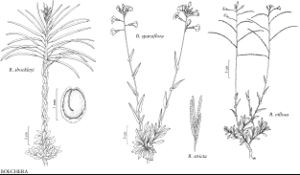Boechera stricta
Novon 13: 389. 2003.
Biennials or perennials; usually short-lived; sexual; caudex usually not woody. Stems usually 1–4 per caudex branch, usually arising from center of rosette near ground surface, rarely arising laterally proximal to sterile shoots, 1.5–8(–10.2) dm, glabrous or sparsely pubescent proximally, trichomes sessile, usually 2-rayed, rarely simple, 0.3–0.7 mm, glabrous distally. Basal leaves: blade oblanceolate, 1.5–8(–14) mm wide, margins usually entire, rarely dentate, ciliate, trichomes (sessile, usually 2-rayed, rarely simple ones at petiole base), surfaces usually pubescent, sometimes glabrous, trichomes sessile, 2-rayed (malpighiaceous), 0.3–0.7 mm. Cauline leaves: 6–52, concealing stem proximally; blade auricles 0.5–3 mm, surfaces of distalmost leaves glabrous. Racemes 8–35(–80)-flowered, usually unbranched. Fruiting pedicels erect, straight, 5–18(–25) mm, glabrous. Flowers erect at anthesis; sepals glabrous; petals white (usually aging pale lavender), (5–)7–11 × 1.5–2.7 mm, glabrous; pollen ellipsoid. Fruits erect, appressed to rachis, not secund, straight, edges parallel, 4–9(–10.2) cm × 1.5–3.5 mm; valves glabrous; ovules 110–216 per ovary; style 0.05–0.3 mm. Seeds biseriate, 1.3–2.2 × 1–1.6 mm; wing lateral and distal, 0.3–0.8 mm wide. 2n = 14.
Phenology: Flowering May–Aug.
Habitat: Rocky slopes and gravelly soil in sagebrush and mountain shrub communities, open conifer and hardwood forests, alpine meadows
Elevation: 700-3900 m
Distribution

Alta., B.C., N.W.T., Que., Sask., Yukon, Alaska, Ariz., Calif., Colo., Idaho, Iowa, Maine, Mass., Mich., Minn., Mont., Nev., N.H., N.Mex., N.Dak., Ohio, Oreg., R.I., Utah, Vt., Wash., Wis., Wyo.
Discussion
Arabis drummondii is the correct name for this species in that genus; the epithet stricta has priority in Boechera. This very distinctive species is easily recognized by having basal leaves with branched trichomes, all sessile and 2-rayed (malpighiaceous). It is also the most promiscuous, having formed apomictic hybrids with at least 15 other species of Boechera.
Selected References
None.
